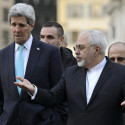In a strange twist, not only is Israel concerned about Obama’s negotiations leading to a nuclear Iran, but there may also be several Arab nations cheering Netanyahu on as he speaks to congress. The Wall Street Journal reported that several major Sunni states would prefer a failure of negotiations to a treaty that leaves Iran’s nuclear infrastructure in place.
“At this stage, we prefer a collapse of the diplomatic process to a bad deal,” an Arab official told WSJ. The unnamed official has reportedly discussed Iran with the Obama administration and Saudi Arabia in recent weeks.
Though the Obama administration has been very tight-lipped about the details of the negotiations, claiming their sensitive nature, some details have surfaced. Reports indicate that Obama has agreed to many of the demands, leaving Iran with threshold nuclear capabilities that would enable it to develop a nuclear weapon within a few months. US officials are quoted as saying that it is no longer plausible to eliminate Iran’s entire nuclear infrastructure, suggesting that any final deal would leave some of their nuclear capabilities in place.
Prime Minister Netanyahu’s stance has been clear, and he has stated it on many occasions:“The pending agreement with Iran is an agreement that endangers the State of Israel. It leaves Iran with capabilities that will allow it to arm itself with nuclear weapons, one bomb at first and afterwards many atomic bombs. We cannot live with such an agreement; therefore, we oppose it.”
Though no Arab state has yet to declare openly that it sides with Israel against Iran, reports from Iranian media claim that the head of the Saudi intelligence service met with several senior Israeli security officials and that a Saudi Arabian delegation flew to Israel for meetings with high-ranking Israeli officials, including Netanyahu.
More credibly, it was reported by Channel 2 that in meetings with European sources, the Saudis have expressed their willingness to cooperate with Israel on Iran, including use of Saudi air space by the IDF for a possible air strike, according to a report by Channel 2. For this to happen, the Saudis would need to see progress in negotiations between Israelis and Palestinians towards a two-state solution before having enough legitimacy to allow Israel to use their air space.
Iranian nuclear capability would force other countries in the region to enter into a nuclear arms race, either as a result of being threatened by Iran, in the case of Turkey, or as a means to establish dominance and credibility, as in the case of Egypt and Saudi Arabia
On Tuesday, White House spokesman Josh Earnest denied disturbing reports that the United States was negotiating a 10-year nuclear deal with Iran.

